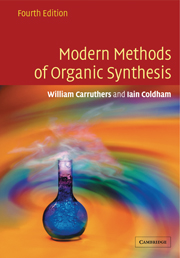Book contents
Preface to the first edition
Published online by Cambridge University Press: 05 June 2012
Summary
This book is addressed principally to advanced undergraduates and to graduates at the beginning of their research careers, and aims to bring to their notice some of the reactions used in modern organic syntheses. Clearly, the whole field of synthesis could not be covered in a book of this size, even in a cursory manner, and a selection has had to be made. This has been governed largely by consideration of the usefulness of the reactions, their versatility and, in some cases, their selectivity.
A large part of the book is concerned with reactions which lead to the formation of carbon–carbon single and double bonds. Some of the reactions discussed, such as the alkylation of ketones and the Diels–Alder reaction, are well established reactions whose scope and usefulness has increased with advancing knowledge. Others, such as those involving phosphorus ylids, organoboranes and new organometallic reagents derived from copper, nickel, and aluminium, have only recently been introduced and add powerfully to the resources available to the synthetic chemist. Other reactions discussed provide methods for the functionalisation of unactivated methyl and methylene groups through intramolecular attack by free radicals at unactivated carbon–hydrogen bonds. The final chapters of the book are concerned with the modification of functional groups by oxidation and reduction, and emphasise the scope and limitations of modern methods, particularly with regard to their selectivity.
- Type
- Chapter
- Information
- Modern Methods of Organic Synthesis , pp. ix - xPublisher: Cambridge University PressPrint publication year: 2004



